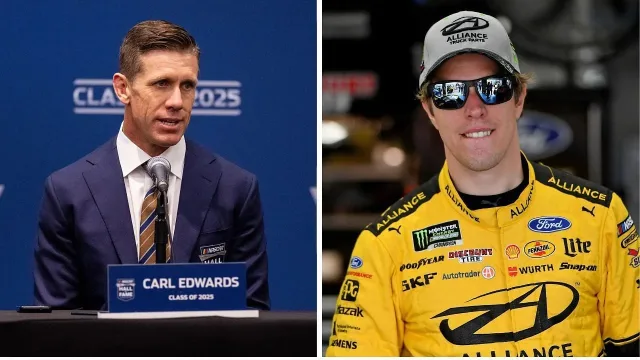The Brad Keselowski Gateway penalty incident remains one of the most memorable and contentious moments in NASCAR history, with Carl Edwards voicing strong support for NASCAR’s disciplinary action against both himself and Keselowski after their clash at Gateway International Raceway in 2010. The fierce rivalry and emotions on display during and after the race left a lasting impact on the drivers, the fans, and the sport itself.
High Stakes and Hard Racing Lead to Controversy at Gateway
The 2010 Missouri-Illinois Dodge Dealers 250 Xfinity Series race at Gateway featured a tense showdown between Carl Edwards, driving for Roush Fenway Racing, and Brad Keselowski. As the race narrowed to its final lap, Edwards led the field, only for Keselowski to close in and bump him in Turn 1, forcing Edwards up the track. On the following straightaway, Edwards retaliated in Turn 3, hitting Keselowski’s car and sending it crashing into the wall. The incident triggered a multi-car pileup, with Edwards taking the race win and Keselowski finishing 14th after a heavy impact that nearly resulted in being hit broadside.
The aftermath extended beyond the physical wreck, as the confrontation reignited a long-standing rivalry and raised questions about aggressive driving and sportsmanship in NASCAR. The nature of the incident, including the purposeful contact between two top drivers, attracted national scrutiny and debate over driver accountability.

NASCAR Responds with Harsh Penalties for Both Drivers
In the days that followed, NASCAR investigated the events at Gateway and determined that both Carl Edwards and Brad Keselowski had violated the series’ code of conduct on-track. As a result, both drivers were placed on probation for the remainder of the 2010 Xfinity Series season. Edwards received an additional penalty: a $25,000 fine and a deduction of 60 driver points, reflecting the severity of his actions in causing the wreck.
Carl Edwards addressed his approach and feelings regarding the incident, defending his driving style while emphasizing his unwillingness to be pushed around on the track.
“I don’t think there one championship driver that can go along and let someone take wins away from him. I race hard and I’m not gonna let somebody take advantage of me, that’s for sure. I’ve been consistent about that and honest about it.”
—Carl Edwards, Champion NASCAR Driver
Carl Edwards Offers Regret—But Only to Other Involved Competitors
Renowned for his athletic backflip celebrations following victories, Edwards chose not to appeal the penalty imposed upon him. Instead, he maintained relief that NASCAR equally penalized Brad Keselowski, asserting that the sanction recognized the role both drivers played in the controversial finish. The focus of Edwards’s apology was on the collateral damage, as several drivers were caught in the aftermath of the wreck. However, Edwards notably refrained from extending that apology to Keselowski himself, reinforcing the depth of competition and rivalry between the two.
“I sincerely apologize to the other guys who were caught up in that wreck. But I’m real happy with is that NASCAR realized Brad needed to be penalized, too. My race car could have been the one turned around instead of his,”
Edwards said, as quoted by ESPN. —Carl Edwards, Champion NASCAR Driver
Lasting Effects on Rivalries and Careers
The Gateway incident stands out as a defining point in the heated rivalry between Carl Edwards and Brad Keselowski. That fierce competition became one of the trademarks of the era, leaving fans, teams, and the wider NASCAR community to grapple with questions of sportsmanship and retaliation in racing. Both drivers went on to accomplish significant achievements: Keselowski later secured the 2012 NASCAR Cup Series championship, while Edwards continued to compete at the top level before retiring in 2016. Edwards has since stepped into an analyst role for NASCAR on Prime Video, offering perspective drawn from bitter experiences like Gateway.
The Brad Keselowski Gateway penalty incident remains a symbol of NASCAR’s willingness to penalize even its top stars when necessary, and continues to influence how driver rivalries are managed and adjudicated within the Xfinity and Cup Series. The event’s legacy is still felt when hard racing pushes boundaries and tempers flare on the track.
Our Reader’s Queries
Q. Is Brad Keselowski Polish?
A. Good luck to Brad Keselowski, a seasoned NASCAR driver with Polish roots, as he competes in the NASCAR Chicago races this weekend. Brad races full-time in the NASCAR Cup Series, driving the No. 6 Ford Mustang Dark Horse.
